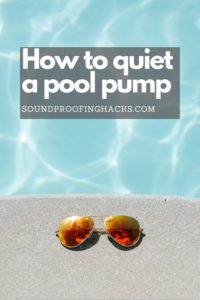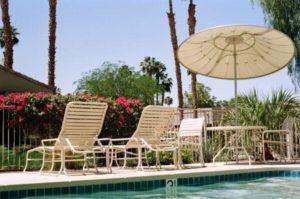How to quiet a pool pump: 3 easy steps to start today!
Are you starting to get used to the feeling of being disturbed during your naps by the noisy pool pump?
Imagine if the noise went away, no longer having to sacrifice your sleep and enjoying the comforts of a pool without the noise?

For now, even if your reality doesn’t match the peace you imagined, there are ways to achieve it without shelling out all your hard-earned cash.
No, you won’t have to buy earmuffs to drown out the noise or wait for the house members to leave the house so you can run the pool pump.
Instead of preparing for an attorney for a pending lawsuit or straightening up your family members, the following solutions will restore your peace.
If you want to know how to quiet a pool pump, be sure to read till the end for all the methods you can use right away.
I am an Amazon Affiliate, which means I may make a commission if you purchase something through the links here. There is NO extra cost to you at all, and THANK YOU so much for the support.
Related: How to soundproof a room for drums: Turn it into a reality now!
Contents: Skip to section
Noise or No Noise – Do you really need a pool pump?
Pool pumps are essential for those who own a pool. Unless you don’t mind your pool stinking badly and become a germ fest.
Emptying a whole pool each time you want to clean it isn’t ideal, so people use a pool pump that has a filter to clean the water of impurities, collect debris and rid most germs before the water is sent back into the pool.
A standard pool pump hums along at 65 – 90 db, about the same as a washing machine
The frequently running pool pumps can have obstructive elements stuck in its filter, which is often among the primary causes of loud noises apart from the motor brushes that clean out the filth.
Other causes could include the incorrect functioning of one or more of the mechanical parts but it is far less likely to occur than finding out that the bolting used to affix the pump to the ground has gotten loose.
For a pool pump to be noisier than usual is a sign that it requires proper maintenance and possibly costly repairs if not fixed in due time.
You can resolve this by yourself without calling a technician by following the guidelines here.
Related: Best Quiet Vacuum Cleaners 2020: 18 Different Ones Reviewed!
What should you do to quiet a pool pump?
Do yourself a favor and instead of still wondering what’s causing the working noisy pool pump to wreck your composure, check around its fixtures.

When the pump is running rather louder than it did during its early phase, it might be time for you to carefully observe and notice any shakiness or vibrations on the body of the pump motor itself.
Finding out that a loose bearing or an unstable base has been the cause of pain to your ears is pretty common and you can eliminate it by tightening any of the loose bits that you could see.
Replacing the temporary or permanent concrete base under the pump with rubberized plates or replacing the aged rubberized plates with new ones will also prove to be helpful.
Doing this will noticeably fix the vibrations from the pump as the rubber is globally used as a supporting medium to absorb vibrations in machinery.
Related: 6 of the Best Quiet Garbage Disposals
Step 1: Clear the field
This could be a no-brainer if you understand the mechanics of how an engine of the car works or any rotating machinery works that are used to clean or burst out air and other elements.
Basically, over time, the meshed filter basket has accumulated plenty of debris and objects that reduce its functioning potential or even prevent a smoother function as a whole.
Getting brushes or cleaning appliances to either brush out or suck out the particles would prove to be beneficial here. Do not use a vacuum cleaner to perform this job!
Once you’ve cleaned the filter baskets then you’ll notice a better intake of water and minimal noise too. Do it once each week without fail to maintain the effectiveness of both the pump and your pool.
Step 2: Declutter the guns
When cleaning the mesh basket doesn’t work, take a look at the impellers attached to the pump that manage both the intake and outtake of the pool water.

Objects such as stuck leaves and twigs could very well prevent the smooth flow of water which can be removed by running water through the impellers for a while instead of using rods and similar items to pry them out.
Check if the problem still exists and if it does, unplug the pump and clean the pipes with a metal wire or similar utility item that wouldn’t puncture a hole or crack the pipes.
Upon completing this procedure, carefully place the motor back to its original position.
Step 3: Clean the bin
The alternative pump basket located above the pump which we removed to unscrew the motor could in fact contain particles that cause noise in the machinery.
Water objects and small items could find impossible corners to get stuck at and show stubbornness during the process of removing them.
You can take out this basket and thoroughly wash it or cleanse it with other means before putting it back where it belongs.
Recommended Gear
After everything that you’ve done so far, if you’ve again found harmony within your surroundings in the absence of the pool pump noise, then you’re good to keep this bookmarked for future reference.
But, in case none of the above ways helped you fix your issue with a faulty pool pump then something bigger could be the cause behind why the machinery has been throwing fits.
Rusted parts and loose bearings should be fixed or replaced with exact or precisely similar parts to avoid blowing up the pump and endangering the well being of your family.
If you’ve tightened the parts too much then consider loosening them by some fraction as they could cause unnecessary friction which can be a cause for the noise.
Check out these recommendations that you can use to replace parts or get a new motor altogether.
Related: How to make air conditioner quieter? 6 simple tips that work!
Pumps
Intex Krystal Clear Cartridge Filter Pump
- Easy to use with 1000 GPH Pump Flow Rate
- Suitable for pools up to 6,000 gal of water
- With air release valve for air trapped inside the filter chamber
Intex 28633EG Krystal Clear Cartridge Filter Pump
- Easy to use with 2500 GPH Pump Flow Rate
- Suitable for pools up to 15,200 gal of water
- With air release valve for air trapped inside the filter chamber
Intex Krystal Clear Sand Filter Pump
- Pump flow rate: 3000 GPH
- 24-hour automatic timer
- 6 function control for automatic cleaning
Rubber Pads
Anti Vibration Rubber & Cork Pads
- 50 PSI max load
- Eco-friendly indoor & outdoor application
- Resist Aging, Compression Set, Water & Oil
Rubber Anti-Vibration Isolation Pads
- 60 PSI max load,960 lbs per pad max
- Made of High Strength Rubber and EVA center material
- Eco-friendly indoor & outdoor application
Anti Vibrational Isolation Pads
- 50 lbs per sq inch with max load 1800 lbs per pad
- Resist Aging, Compression Set, Water & Oil, Can be cut
- Rubber waffle type for indoor & outdoor use
Filters
Pool Replacement Type A or C Filter Cartridge
- Made from Dacron material, easy to clean and replace
- For pumps with: 530 GPH – 1,500 GPH
- Fits pumps with both Type A and Type C filters
Type B Pool Filter Cartridge
- Made from Dacron material, easy to clean and replace
- Thicker, heavier paper with more pleats
- Fits pumps with Type B filters
Eco-Friendly Filter Media for Sand Filters
- Anti Bacterial made from100% polyethylene
- Machine wash friendly for better longevity
- Can filter particles between 3 – 5 microns too
Frequently Asked Questions (FAQ)
Why is my pool pump making loud noises?
A pool pump gets louder when the bearings are loose or when there are unwanted objects cluttering the various parts of the pool pump.
What is the average life of a pool pump?
A pool pump could very well last you between 8-12 years only if it’s been well maintained as various aspects rule the functional consistency of the pump.
What’s the ideal number of hours to run a pool pump?
The swimming pool pumps are well capable of pumping and cleaning gallons of water on an average of 8 hours so do not overrun the pump.
Is it safe to let the pool pump remain outside during rain?
With rainfall, there’s a significant risk flooding of the pool pump which will be solved only with replacement. You could avoid doing so by safely removing it and keeping it indoors to also prevent rusting.
Could a DIY fix a loud pool pump?
Yes and no. Our guide will help you clean various parts of the pool pump by yourself but any serious replacements might require getting new parts or contacting a service technician.
Does a pool pump require ventilation?
Yes, otherwise the motor might overheat and become faulty. You must ensure there is enough space for air to flow, so be sure to declutter it.
How to quiet a pool pump: Conclusion
The pool pump is a crucial commodity if you want a swimming pool that is clean and also safe from most infectious particles. Same way, taking proper care of the same pump at regular intervals of time would go a long way for maintaining the integrity of the said pump which will also eradicate any extra loud noises. Using our guide you can solve most of your problems to obtain relief and quiet from a whining and noisy pool pump.
All related links:
- How to soundproof a room for drums: Turn it into a reality now!
- Best Quiet Vacuum Cleaners 2020: 18 Different Ones Reviewed!
- 6 of the Best Quiet Garbage Disposals
- How to make air conditioner quieter? 6 simple tips that work!
Additional resources:









